

How Self Improvement Apps Impact People’s Habits. How to Break a Bad Habit (and Replace It With a Good One) Keystone Habits: How One Small Change Can Improve Your Entire Life. Michael Phelps is the most decorated Olympian of all time.
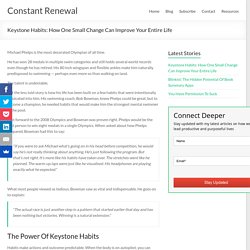
He has won 28 medals in multiple swim categories and still holds several world records even though he has retired. His 80 inch wingspan and flexible ankles make him naturally predisposed to swimming — perhaps even more so than walking on land. The talent is undeniable. But the less told story is how his life has been built on a few habits that were intentionally inculcated into him. His swimming coach, Bob Bowman, knew Phelps could be great, but to become a champion, he needed habits that would make him the strongest mental swimmer in the pool. Fast forward to the 2008 Olympics and Bowman was proven right. “If you were to ask Michael what’s going on in his head before competition, he would say he’s not really thinking about anything. What most people viewed as tedious, Bowman saw as vital and indispensable. “The actual race is just another step in a pattern that started earlier that day and has been nothing but victories. Comments. Identity-Based Habits: How to Actually Stick to Your Goals This Year.
Change is hard.
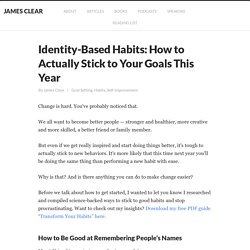
You've probably noticed that. We all want to become better people — stronger and healthier, more creative and more skilled, a better friend or family member. Habits vs Goals : A Look at the Benefits of a Systematic Approach to Life. The Domino Effect: How to Create a Chain Reaction of Good Habits. Human behaviors are often tied to one another.
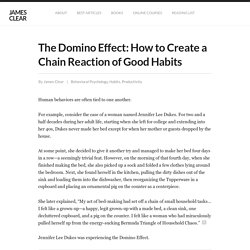
For example, consider the case of a woman named Jennifer Lee Dukes. For two and a half decades during her adult life, starting when she left for college and extending into her 40s, Dukes never made her bed except for when her mother or guests dropped by the house. At some point, she decided to give it another try and managed to make her bed four days in a row—a seemingly trivial feat. However, on the morning of that fourth day, when she finished making the bed, she also picked up a sock and folded a few clothes lying around the bedroom.
This Is How To Make Good Habits Stick: 6 Secrets From Research. We all want to get to the gym, be more productive, be kinder to our loved ones… and then we don’t do it.
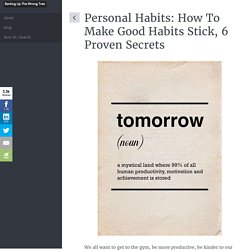
Why? Well, building solid personal habits can be hard. In fact, research shows it takes an average of 66 days to build a new good habit. Uk.businessinsider. How I Became A Morning Person, Read More Books, And Learned A Language In A Year. You’ll notice that I made the title of this post sound quite impressive (at least I hope I did!).

But the great thing about this story is that anyone can have such an impressive outcome, and it’s not at all as daunting as it might sound. In fact, all these outcomes came from doing small things every day over a long period. I’m a big fan of working smarter, not harder and finding small ways to make my work more efficient. As I became Buffer’s first content crafter about two years ago, I got the chance to explore these topics quite a lot. When did the self-help movement lose its ethical ser...
With metronomic regularity, new books about both the strange and the mundane things human beings do with metronomic regularity become bestsellers.
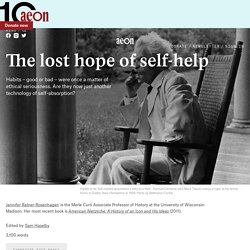
The American ‘habit’ industry produces a huge popular literature examining how habits are formed and how they are broken, how they enable and how they hinder, and how they are a function of heroic self-discipline or a confession of its absence. They maintain that people can cultivate not just a ‘learning habit’ but even an ‘achievement habit’. They suggest that ‘Jesus habits’ and ‘joy habits’ are liberating, but that the ‘worry habit’ is shackling. ‘Habits not diets’ are the best way to free the self from the siren call of the refrigerator. Much of today’s habits literature has a contemporary feeling, with its focus on time management, individual productivity, and business success, but the genre has a long history.
How to Stick With Good Habits Every Day by Using the "Paper Clip Strategy" In 1993, a bank in Abbotsford, Canada hired a 23-year-old stock broker named Trent Dyrsmid.

Dyrsmid was a rookie so nobody at the firm expected too much of his performance. Moreover, Abbotsford was still a relatively small suburb back then, tucked away in the shadow of nearby Vancouver where most of the big business deals were being made. The first popular email services like AOL and Hotmail wouldn’t arrive for another two or three years. Geography still played a large role in business success and Abbotsford wasn’t exactly the home of blockbuster deals. And yet, despite his disadvantages, Dyrsmid made immediate progress as a stock broker thanks to a simple and relentless habit that he used each day.
On his desk, he placed two jars. This Is The #1 Ritual You Need To Do Every Day. The Psychology of Self-Control. By Maria Popova.
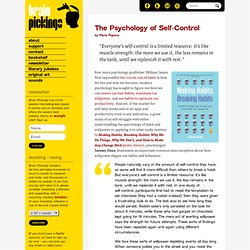
Habits: Why We Do What We Do - HBR IdeaCast. An interview with Charles Duhigg, reporter for The New York Times and author of The Power of Habit: Why We Do What We Do in Life and Business.
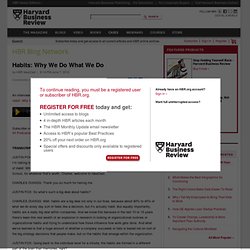
Download this podcast JUSTIN FOX: Welcome to the HBR IdeaCast from Harvard Business Review. How to Build a New Habit: This is Your Strategy Guide. According to researchers at Duke University, habits account for about 40 percent of our behaviors on any given day.
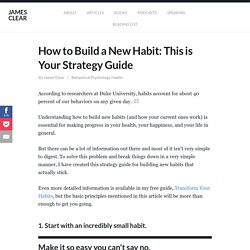
Understanding how to build new habits (and how your current ones work) is essential for making progress in your health, your happiness, and your life in general. The Chemistry of Building Better Habits. There is a concept in chemistry known as activation energy. Here’s how it works: Activation energy is the minimum amount of energy that must be available for a chemical reaction to occur. Let’s say you are holding a match and that you gently touch it to the striking strip on the side of the match box. Nothing will happen because the energy needed to activate a chemical reaction and spark a fire is not present. However, if you strike the match against the strip with some force, then you create the friction and heat required to light the match on fire.
5 Common Mistakes That Cause New Habits to Fail (and What to Do About Them) Welcome to 2015. It’s New Year’s Resolution time. Depending on where you get your numbers, somewhere between 81 percent and 92 percent of New Years Resolutions fail. [1] Translation: At least 8 times out of 10, you are more likely to fall back into your old habits and patterns than you are to stick with a new behavior. Behavior change is hard. No doubt about it. How to Change Your Beliefs and Stick to Your Goals for Good.
In one of my very first articles, I discussed a concept called identity-based habits. The basic idea is that the beliefs you have about yourself can drive your long-term behavior. Maybe you can trick yourself into going to the gym or eating healthy once or twice, but if you don’t shift your underlying identity, then it’s hard to stick with long-term changes. Most people start by focusing on performance and appearance-based goals like “I want to lose 20 pounds” or “I want to write a best-selling book.” But these are surface level changes. The root of behavior change and building better habits is your identity.
This brings us to an interesting question. How Simple Mini Habits Can Change Your Life. “The only way to make sense out of change is to plunge into it, move with it, and join the dance.” ~Alan Watts It was late 2012, just after Christmas, and like many others I was reflecting on the year. How to Stay Focused When You Get Bored Working Toward Your Goals. We all have goals and dreams, but it can be difficult to stick with them. Each week, I hear from people who say things like, “I start with good intentions, but I can’t seem to maintain my consistency for a long period of time.” Or, they will say, “I struggle with mental endurance. I get started but I can’t seem to follow through and stay focused for very long.” Don’t worry. I’m just as guilty of this as anyone else.
For example, I’ll start one project, work on it for a little bit, then lose focus and try something else. Maybe you have felt this way too. Why Successful Habits Are About Structure, Not Effort. As the founder and CEO of Lift, a popular set-goals-and-do-them-every-day app, Tony Stubblebine is immersed in the hows and how nots of what makes for productive habits. In a recent talk with us, he shared his own secrets of productivity, like the necessity of rituals, why he found an office right next to a gym, and why putting your running shoes on is better than setting a goal of running 20 miles. An edited version of the interview is below.
How Habits Shape Your Health, Happiness, and Wealth. In 1936, a man named Kurt Lewin wrote a simple equation that changed the way we think about habits and human behavior. The equation makes the following statement: Behavior is a function of the Person in their Environment. [1] 5 Secrets to Better Life Habits. How To Trick Your Brain To Hold On To Positive Habit Changes. We truly are creatures of habit. Nearly half of our everyday behaviors tend to be repeated in the same location almost every day, according to research out of Duke University. That means most of the time we are running on autopilot. Warning - Habits May Be Good for You. The 5 Triggers That Make New Habits Stick. In his best-selling book, The Power of Habit (audiobook), author Charles Duhigg explains a simple three-step process that all habits follow. This cycle, known as The Habit Loop, says that each habit consists of… The Trigger: the event that starts the habit.The Routine: the behavior that you perform, the habit itself.The Reward: the benefit that is associated with the behavior.
The image below shows how these three factors work together to build new habits. [1] Top 10 Ways to Break Bad Habits. Trying to Start a New Habit? Mornings Matter - 7Min Blog. “Opportunities are like sunrises. If you wait too long, you miss them”